In the latest phase of the music industry’s race to the bottom, Spotify announced last week that it would give artists more visibility in its algorithm in exchange for reduced royalty payments. Those would be even lower than the current rate, which is about a third of a cent per play. The tradeoff follows a decades-long trend affecting virtually all American industries: the devaluation of workers.
If the pandemic has shown us one thing, it’s that we need art to keep us going. When we needed a bit of joy—or motivation or commiseration—during this horrific year, our favorite songs have been there. Yet the people creating music we love, with the exception of the industry’s top stars, are struggling to make a living as the concert industry flounders during COVID-19. Now is not the time for Spotify to use independent artists’ eagerness to get noticed to lower their earnings even further.


